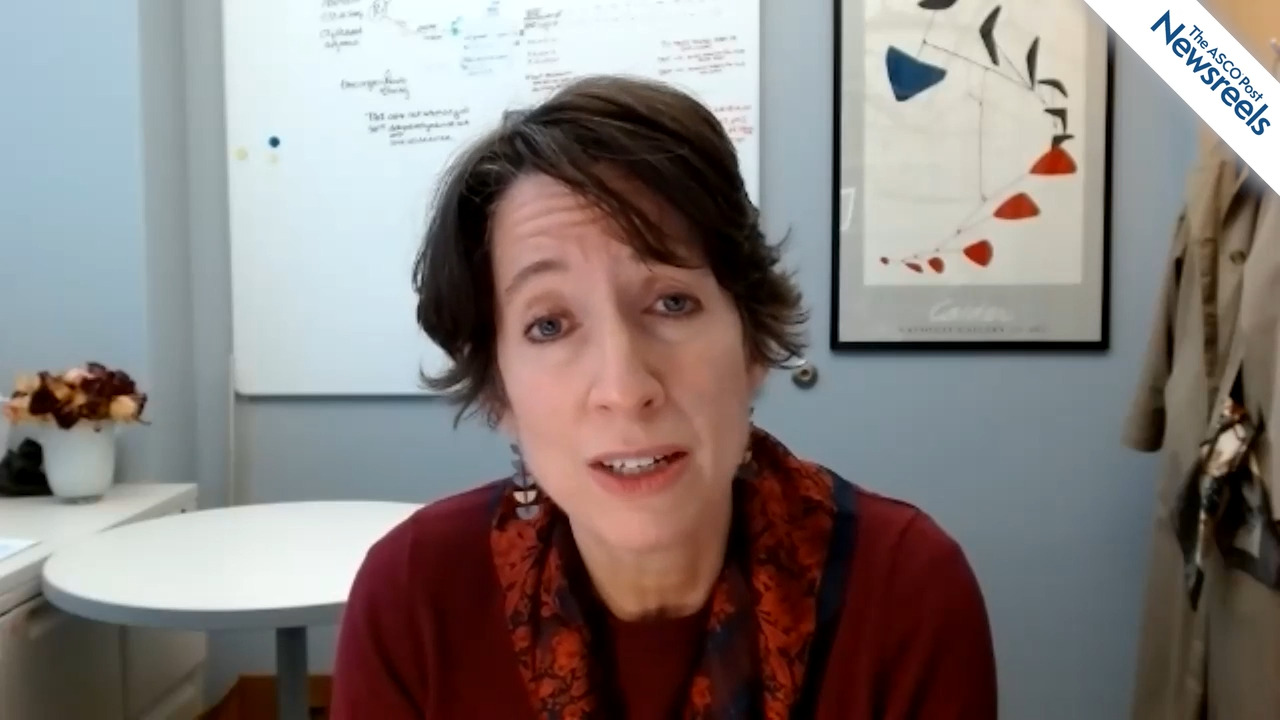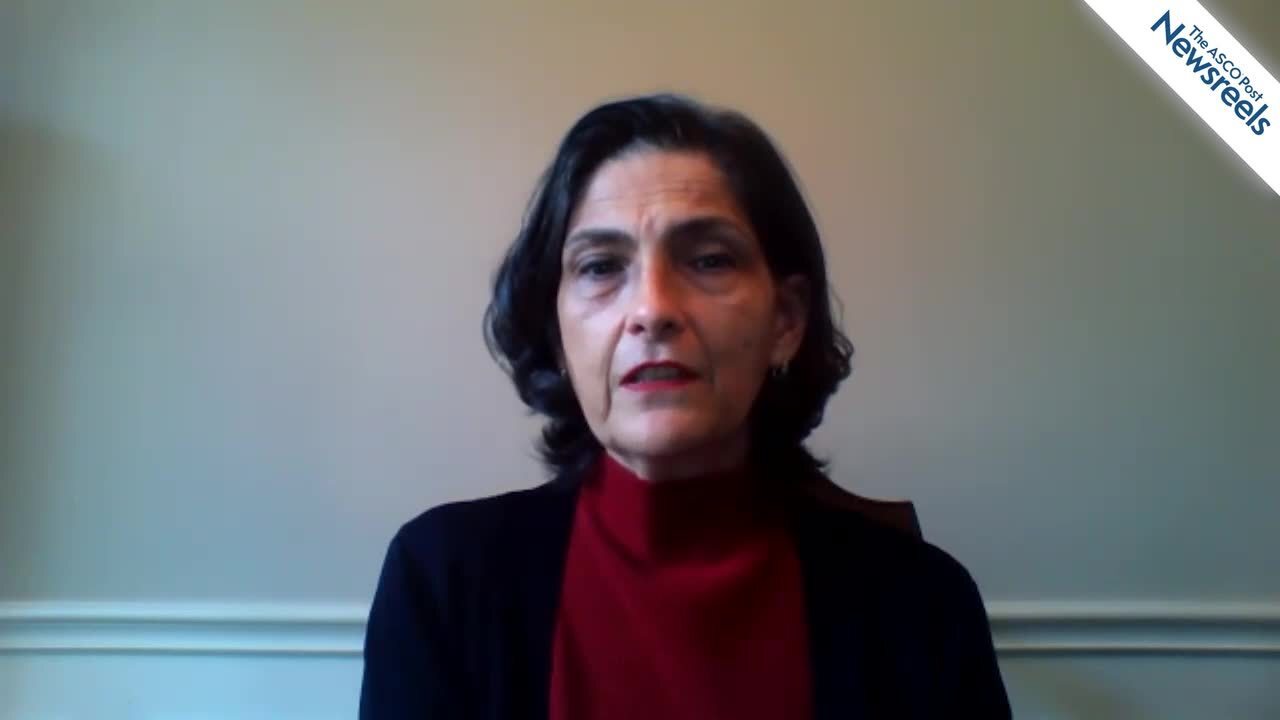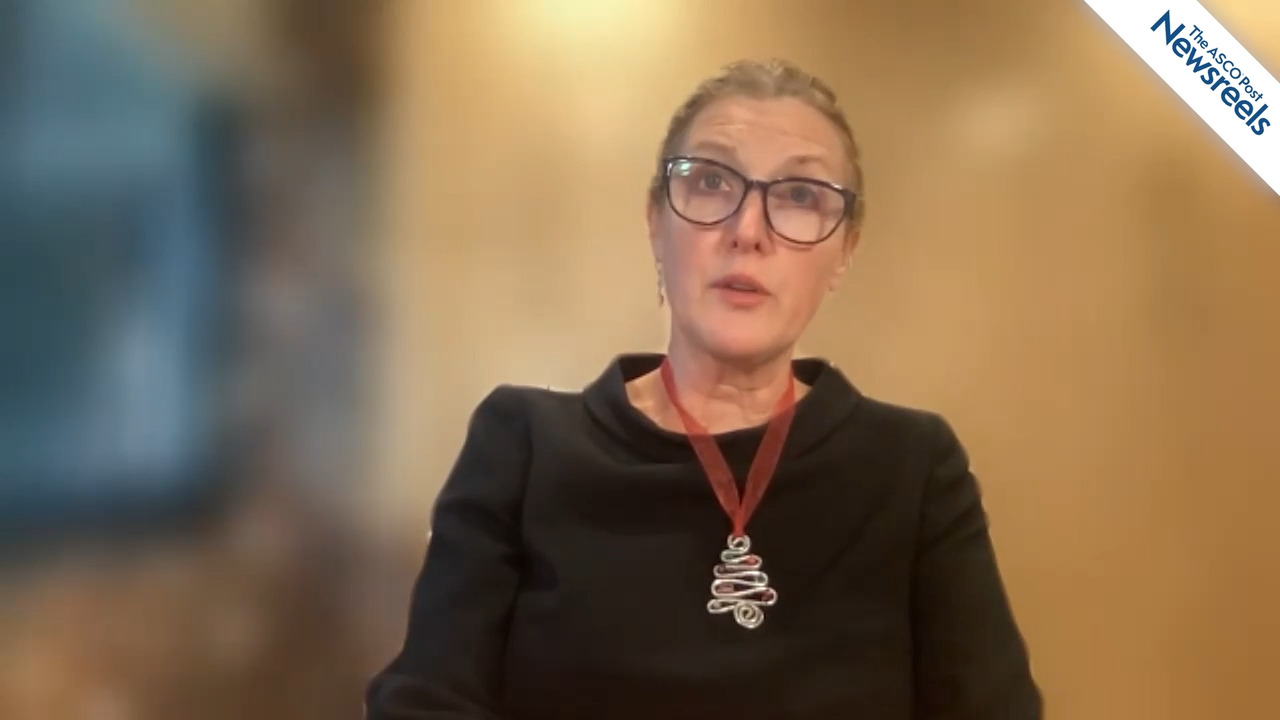KEYNOTE-522: Sensitivity Analyses Confirm Value of Neoadjuvant Pembrolizumab in Triple-Negative Breast Cancer
Updated results from the pivotal KEYNOTE-522 trial have confirmed the benefit of neoadjuvant therapy with pembrolizumab plus chemotherapy in patients with early triple-negative breast cancer.1 The results were presented at the 2021 San Antonio Breast Cancer Symposium by Peter Schmid, MD, PhD,...
PALLAS Trial in Hormone Receptor–Positive, HER2-Negative Breast Cancer: Defining the Role of Adjuvant CDK4/6 Inhibition
Over the past 7 years, the introduction of combined endocrine therapy with cyclin-dependent kinase (CDK) 4/6 inhibitors resulted in a dramatic improvement in outcomes for patients with metastatic, hormone receptor–positive, HER2-negative breast cancer. Early attempts to modulate the cell cycle with ...
PALLAS Trial: No Invasive Disease–Free Survival Benefit With Addition of Adjuvant Palbociclib to Endocrine Therapy in Early Breast Cancer
As reported in the Journal of Clinical Oncology by Michael Gnant, MD, of the Comprehensive Cancer Center, Medical University of Vienna, and colleagues, the final analysis of the phase III PALLAS trial has shown no invasive disease–free survival benefit with the addition of adjuvant palbociclib to...
Compression Sleeves to Reduce Risk of Arm Swelling in Women Undergoing Surgery for Breast Cancer
In an Indian single-center study reported in the Journal of Clinical Oncology, Paramanandam et al found that the prophylactic use of compression sleeves reduced the risk of arm swelling in women with breast cancer undergoing axillary lymph node dissection. Study Details In the study, 301 evaluable...
Can An Intelligent Vacuum-Assisted Biopsy Algorithm Reliably Identify Patients With Breast Cancer Who Have a Pathologic Complete Response to Neoadjuvant Therapy?
In a study reported in the Journal of Clinical Oncology, Pfob et al developed a machine learning algorithm–based (intelligent) vacuum-assisted biopsy model that could identify patients with pathologic complete response (ypT0 and ypN0) to neoadjuvant therapy for breast cancer who may be able to...
Association of Breast Cancer Subtypes With Pathogenic Germline Variants in Nine Breast Cancer Susceptibility Genes
In a study reported in JAMA Oncology, researchers from the Breast Cancer Association Consortium found that pathogenic germline variants in nine breast cancer susceptibility genes were associated with different breast cancer subtypes, although most were also associated with triple-negative disease....
Predictive Model for Severe Fatigue After Breast Cancer Diagnosis
In a study reported in the Journal of Clinical Oncology, Di Meglio et al developed a predictive model for severe fatigue after a diagnosis of breast cancer. Study Details The study involved data on patients with stage I to III breast cancer included in the prospective multicenter CANcer TOxicity...
Role of CECR2 Gene in Advanced Triple-Negative Breast Cancer
A new study published by Zhang et al in Science Translational Medicine shows inhibition of the CECR2 gene may prevent triple-negative breast cancer from advancing or metastasizing. The discovery is an early step in finding new therapeutics for triple-negative breast cancer, one of the most...
Pyrotinib and Capecitabine in HER2-Positive Breast Cancer With Brain Metastases
In the Chinese phase II PERMEATE trial reported in The Lancet Oncology, Yan et al found that the combination of the pan-HER receptor tyrosine kinase inhibitor pyrotinib plus capecitabine produced high intracranial response rates in women with HER2-positive breast cancer and brain metastases,...
Use of Autologous Metastasis Mutation–Reactive TILs in Metastatic Breast Cancer
In a National Institutes of Health study reported in the Journal of Clinical Oncology, Zacharakis et al found that treatment with autologous tumor-infiltrating lymphocytes (TILs) reactive to mutations in metastatic lesions produced responses in patients with metastatic breast cancer. Study Details...
Can Postsurgical Monoclonal Antibody Treatment Reduce HER2-Positive Early-Stage Breast Cancer Recurrence?
Treating women diagnosed with a certain type of early-stage breast cancer with the monoclonal antibody trastuzumab after surgery may reduce the risk of the cancer returning, according to a report published by Ali et al in Scientific Reports. The research team from the University of Saskatchewan...
Outcomes in a Large Cohort of Patients With Ultra-Low–Risk Breast Cancer: Analysis From the MINDACT Trial
As reported in the Journal of Clinical Oncology by Josephine M.N. Lopes Cardozo, MD, and colleagues, long-term follow-up in the phase III MINDACT trial has shown excellent outcomes among a large group of patients with ultra-low–risk breast cancer as classified by the 70-gene signature assay, with...
Palbociclib Exposure and Discontinuation and Potential Impact on Outcome in the PALLAS Trial
In an analysis reported in the Journal of Clinical Oncology, Erica L. Mayer, MD, MPH, and colleagues found that early discontinuation and lower exposure intensity of oral palbociclib did not appear to account for the lack of invasive disease–free survival benefit observed with the addition of...
David Cescon, MD, PhD, Comments on the MONALEESA Analyses
David Cescon, MD, PhD, Clinician Scientist at the Princess Margaret Cancer Centre in Toronto, Canada, was the invited discussant of the two MONALEESA analyses.1,2 He noted that the most recent overall survival analysis, presented at the European Society for Medical Oncology (ESMO) Congress 2021,...
MONALEESA Analyses Show Widespread Benefit for Ribociclib in Hormone Receptor–Positive, HER2-Negative Breast Cancer
Further analyses of the MONALEESA metastatic breast cancer trials have shown that the benefit of ribociclib plus endocrine therapy in the first-line setting extends to most intrinsic molecular subtypes and is consistent across multiple subgroups. The studies were presented at the 2021 San Antonio...
Study Identifies Black Race as Risk Factor for Lymphedema After Axillary Dissection in Women With Breast Cancer
Black women with breast cancer had significantly higher rates of lymphedema after axillary lymph node dissection compared with Hispanic, White, and Asian women in a prospective study of breast cancer–related lymphedema presented at the 2021 San Antonio Breast Cancer Symposium (SABCS). In fact,...
Cardiometabolic Risk Factors in Breast Cancer Survivors
In the case-control Pathways Heart Study reported in the Journal of Clinical Oncology, Kwan et al found that breast cancer survivors had an elevated risk for incident diabetes overall and according to treatment as well as an elevated risk of incident hypertension according to treatment vs controls...
PADA-1 Trial: With Early Identification of ESR1 Mutation, Switch to Fulvestrant in Metastatic Breast Cancer
Switching from an aromatase inhibitor to fulvestrant upon early identification of the ESR1 mutation in plasma—before disease progression—doubled progression-free survival in the phase III PADA-1 trial, presented at the 2021 San Antonio Breast Cancer Symposium.1 “PADA-1 is the first trial to...
Long-Term Outcomes After Neoadjuvant Chemotherapy With or Without Carboplatin and Bevacizumab for Triple-Negative Breast Cancer
In an analysis from the phase II CALGB 40603/Alliance trial reported in the Journal of Clinical Oncology, Shepherd et al found that the addition of carboplatin or bevacizumab to neoadjuvant chemotherapy was not associated with improved long-term outcomes in patients with stage II or III...
Does Early Locoregional Therapy for the Primary Site Improve Survival in Newly Diagnosed Metastatic Breast Cancer?
In the phase III ECOG-ACRIN E2108 trial reported in the Journal of Clinical Oncology, Seema A. Khan, MD, MPH, and colleagues found no difference in overall survival with early locoregional therapy vs continued systemic therapy among women with newly diagnosed stage IV breast cancer and an intact...
Expert Point of View: Anne Blaes, MD
Invited discussant Anne Blaes, MD, Associate Professor of Medicine at the University of Minnesota, Minneapolis, commented on Dr. Braybrooke’s study. “In 18,000 patients in randomized trials initiated before 2012, there was a 15% improvement in recurrence with the use of anthracyclines plus taxanes...
Anthracycline Plus Taxane Reduces Risk of Breast Cancer Recurrence at 10 Years
In a large patient-level meta-analysis of 16 trials, presented at the 2021 San Antonio Breast Cancer Symposium (SABCS),1 the combination of an anthracycline plus a taxane achieved a substantial 15% reduction in breast cancer recurrence at 10 years vs taxane chemotherapy alone, representing an...
Expert Point of View: Steven J. Isakoff, MD, PhD
Steven J. Isakoff, MD, PhD, Director of Breast Cancer Clinical Research at Massachusetts General Hospital, Boston, found the TAMARISK study “interesting.” “Looking at genomic profiles of uterine cancer in both tamoxifen-associated uterine cancer, the researchers found a lower frequency of PIK3...
PI3K Pathway Activation May Underlie Tamoxifen-Associated Uterine Cancer
Even though it is infrequent, uterine cancer can develop in patients treated with tamoxifen. A study presented at the 2021 San Antonio Breast Cancer Symposium (SABCS) suggests that the mechanism by which uterine cancers develop is tamoxifen-induced PI3K pathway activation.1 Patients treated with...
Depression Screening and Behavioral Health Referrals for Patients With Newly Diagnosed Breast Cancer in the Community Oncology Setting
In a study reported in JAMA, Hahn et al found that a depression screening and intervention program resulted in a higher rate of referral to behavioral health services vs education alone among patients with newly diagnosed breast cancer at community oncology centers located in Southern California....
Addition of Capecitabine to Taxane/Anthracycline Adjuvant Chemotherapy for Early Breast Cancer: 15-Year Overall Survival Results of the FinXX Trial
As reported in the Journal of Clinical Oncology by Heikki Joensuu, MD, and colleagues, 15-year overall survival results from the Finland Capecitabine Trial (FinXX) showed that the addition of capecitabine to taxane/anthracycline adjuvant chemotherapy was associated with improved overall survival...
Expert Point of View: Anne Blaes, MD, MS, and Virginia Kaklamani, MD
Commenting on the update of RxPONDER presented at the 2021 San Antonio Breast Cancer Symposium were Anne Blaes, MD, MS, Associate Professor of Hematology/Oncology at the University of Minnesota and Co-Director of the Screening, Prevention, Etiology and Cancer Survivorship Program at the Masonic...
RxPONDER Update Explores Benefit of Chemotherapy in Subgroups
Updated results of the SWOG S1007 RxPONDER trial confirmed the key takeaway from the previous analysis: adjuvant chemotherapy benefits premenopausal women but not postmenopausal women with hormone receptor–positive, HER2-negative disease, one to three positive lymph nodes, and a 21-gene Oncotype DX ...
Meredith M. Regan, ScD, on Early Breast Cancer: Updated Results From the TEXT and SOFT Trials
Meredith M. Regan, ScD, of Dana-Farber Cancer Institute, discusses findings that point to the potential benefits of using adjuvant exemestane plus ovarian function suppression (OFS) to treat premenopausal women with hormone receptor–positive early breast cancer. This conclusion came after 13 years of median follow-up on the TEXT and SOFT trials, during which this regimen was compared with tamoxifen and OFS (Abstract GS2-05).
Elizabeth A. Mittendorf, MD, PhD, on Making Strides in Managing Triple-Negative Breast Cancer
Elizabeth A. Mittendorf, MD, PhD, of Dana-Farber Brigham and Women’s Cancer Center, discusses the progress made in recent years treating patients with triple-negative breast cancer (TNBC), including approval of the immunotherapy agents pembrolizumab and sacituzumab govitecan-hziy, a new standard of care in the preoperative setting for early-stage disease, as well as a better understanding of the biology of TNBC and its heterogeneity.
Second-Line T-DXd Improves Progression-Free Survival Across HER2-Positive Metastatic Breast Cancer Subgroups
The antibody-drug conjugate fam-trastuzumab deruxtecan-nxki (T-DXd) lengthened progression-free survival and improved objective response rate compared to the antibody-drug conjugate ado-trastuzumab emtansine (T-DM1) after trastuzumab and taxane therapy in women with HER2-positive metastatic breast...
Role of Radiologist Experience and Fatigue Level in Recommending Additional Imaging for Patients Undergoing Breast Cancer Screening
Less experienced radiologists are more likely to recommend additional imaging for women undergoing breast cancer screening when they read digital breast tomosynthesis (DBT) images later in the day, according to a new study published by Bernstein et al in the journal Radiology. The results highlight ...
EMERALD Trial: Oral Selective Estrogen Receptor Degrader as Second- or Third-Line Therapy for Advanced Breast Cancer
Use of the first investigational oral selective estrogen receptor degrader (SERD) elacestrant significantly reduced the risk of death or disease progression and lengthened progression-free survival compared with standard-of-care endocrine therapy with fulvestrant or an aromatase inhibitor in...
Study Finds Depression Screening Improves Behavioral Care for Patients With Breast Cancer
Research published by Hahn et al in JAMA showed depression screening for patients with newly diagnosed breast cancer was highly effective at identifying patients in need of behavioral health care. The new screening initiative was subsequently and successfully built into the patient care and daily...
Banu Arun, MD, on Fine-Tuning Risk Assessment and Risk Reduction in Breast Cancer
Banu Arun, MD, of The University of Texas MD Anderson Cancer Center, discusses a session she moderated that included discussion of how exercise and diet may reduce the risk of breast cancer, and emerging non-endocrine treatments that may help prevent the disease.
Long-Term Outcomes According to Residual Cancer Burden After Neoadjuvant Chemotherapy for Breast Cancer
In an analysis reported in The Lancet Oncology, Yau et al found that increasing residual cancer burden (RCB) after neoadjuvant chemotherapy was associated with poorer event-free survival across breast cancer subtypes. Study Details The study included patient-level data on RCB and other clinical and ...
Ann H. Partridge, MD, MPH, on SABCS Meeting Highlights: Expert Perspective
Ann H. Partridge, MD, MPH, of Dana-Farber Cancer Institute, discusses what she considers to be the most notable presentations at the 2021 San Antonio Breast Cancer Symposium. They include the focus on early-stage disease, especially in the TEXT/SOFT, RxPonder, and KEYNOTE-522 trials, as well as abstracts from the Early Breast Cancer Trialists’ Collaborative Group; and new data and novel therapeutics in the advanced setting.
Lisa A. Carey, MD, on HR-Positive and HER2-Negative Advanced Breast Cancer: Overall Survival by Subtype Across Three MONALEESA Studies
Lisa A. Carey, MD, of the University of North Carolina at Chapel Hill and the Lineberger Comprehensive Cancer Center, discusses findings from a pooled analysis of the MONALEESA-2, -3, and -7 trials. Among the findings was a consistent overall survival benefit with ribociclib plus endocrine therapy for patients with luminal A, luminal B, and HER2E breast cancer subtypes. Patients with the basal-like subtype did not derive a benefit from ribociclib, but the sample size was small (Abstract GS1-04).
Charles Coombes, MD, PhD, on Hormone Receptor–Positive HER2-Negative Breast Cancer: Use of Samuraciclib Plus Fulvestrant
Charles Coombes, MD, PhD, of Imperial College, London, discusses study results on samuraciclib, a first-in-class, oral, selective inhibitor of CDK7, in combination with fulvestrant in patients with advanced hormone receptor–positive HER2-negative breast cancer. The combination of agents has demonstrated evidence of anti-tumor activity for patients who have progressed on their prior CDK4/6 inhibitor treatment (Abstract GS3-10).
Breast Cancer Index May Predict Benefit of Extended Endocrine Therapy in Certain Patients With Hormone Receptor–Positive Disease
New data were presented at the 2021 San Antonio Breast Cancer Symposium demonstrating that the Breast Cancer Index (BCI) may predict preferential recurrence-prevention benefit from extended endocrine therapy and may also predict the overall benefit/risk and likelihood of improved health outcomes...
Personalized Therapy vs Physician’s Choice of Treatment for Patients With Residual Triple-Negative Breast Cancer After Neoadjuvant Chemotherapy
In a phase II trial reported in the Journal of Clinical Oncology, Schneider et al found that genomically directed therapy did not improve 2-year disease-free survival vs treatment of physician’s choice in patients with residual triple-negative breast cancer following neoadjuvant chemotherapy. Study ...
Effect of Bupropion vs Placebo on Sexual Desire in Postmenopausal Female Cancer Survivors
In a phase II trial (NRG-CC004) reported in the Journal of Clinical Oncology, Barton et al found that bupropion, a dopaminergic agent, did not improve sexual desire vs placebo as measured by the Female Sexual Function Index (FSFI) desire subscale among postmenopausal women with low desire scores...
Expert Point of View: Matthew J. Ellis, MB, BChir, PhD, FACP
The final results of the phase III PALLAS trial1 are “deeply disappointing,” said session moderator Matthew J. Ellis, MB, BChir, PhD, FACP, Professor of Medicine and Director of the Lester and Sue Smith Breast Center at Baylor College of Medicine. The results of the final primary analysis of PALLAS ...
Final Analysis of PALLAS Trial: No Benefit of Adjuvant Palbociclib Plus Endocrine Therapy in Early Breast Cancer
The final protocol-defined analysis of the phase III PALLAS trial confirmed the negative results of the second interim analysis, showing no benefit of palbociclib plus endocrine therapy in the adjuvant breast cancer setting. Michael Gnant, MD, of the Medical University of Vienna, reported these...
Expert Point of View: Hope S. Rugo, MD, FASCO
Invited discussant of the KEYNOTE-355 trial, Hope S. Rugo, MD, FASCO, one of the coauthors of the study, had presented the survival data at the 2021 European Society of Medical Oncology (ESMO) Annual Congress.1 The San Antonio presentation was a more in-depth evaluation of survival by different...
Identifying Women With Triple-Negative Breast Cancer Who May Benefit From Pembrolizumab Plus Chemotherapy
Results of the phase III randomized KEYNOTE-355 trial showed that the addition of the PD-1 inhibitor pembrolizumab to investigator’s choice of first-line chemotherapy improved progression-free and overall survival in women with metastatic triple-negative breast cancer compared with placebo and...
Study Examines Rates of Breast and Colorectal Cancer Screening Among Rural Women
Women who live in urban areas and those residing in rural areas are screened for breast cancer at similar rates, but rural women are screened for colorectal cancer at significantly lower rates than their urban counterparts, research published by Shete et al in JAMA Network Open showed. The...
Adjuvant T-DM1/Pertuzumab vs Taxane/Trastuzumab/Pertuzumab in High-Risk HER2-Positive Breast Cancer
In the phase III KAITLIN trial reported in the Journal of Clinical Oncology, Ian E. Krop, MD, and colleagues found that adjuvant ado-trastuzumab emtansine (T-DM1) plus pertuzumab did not improve invasive disease–free survival vs a taxane plus trastuzumab/pertuzumab, both following...
Composite Biomarker Needed to Predict Benefit of Immunotherapy in Triple-Negative Breast Cancer
Although there is a biomarker that predicts response to the one approved immunotherapy agent for metastatic triple-negative breast cancer, “it is important to note there are no biomarkers of response to neoadjuvant immunotherapy in early-stage triple-negative breast cancer,” Elizabeth A....
Outcomes With Adjuvant Chemoendocrine vs Endocrine Therapy in Node-Positive Breast Cancer and Association With 21-Gene Assay Recurrence Score
In an interim analysis of the phase III RxPONDER trial reported in The New England Journal of Medicine, Kevin Kalinsky, MD, and colleagues found that the addition of adjuvant chemotherapy to endocrine therapy did not improve invasive disease–free survival among women with hormone receptor–positive, ...






